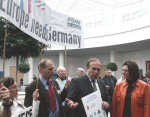24.03.2009 | permalink
Luxembourg to become fifth EU country to ban Monsanto GM maize
Luxembourg is expected to join Austria, France, Greece and Hungary in banning the use and sale of a genetically modified (GM) maize developed by US chemical company Monsanto. ”Last year, EU ministers called for a re-think in the way GM crops are assessed in Europe. Faced with the Commission’s reticence to take these concerns on board, EU countries have no other choice but to protect their citizens and their environment with national bans,” said Marco Contiero, Greenpeace EU GMO policy director.
20.03.2009 | permalink
Cradle of maize rocked by transgenics
Mexico has lifted the ban on experimental cultivation of transgenic maize imposed in 1999 in this country where the crop was first domesticated and shaped human culture. Biotech giants have put forward two dozen projects for approval and have announced investments of 382 million dollars up to 2012. The green light given by the government of conservative President Felipe Calderón to the trials, by means of an executive decree which came into force early this month, has provoked the indignation of activists and campesinos (small farmers) opposed to genetically modified (GM) maize.
18.03.2009 | permalink
Monsanto submits drought-tolerant corn to USDA
St. Louis, Mo.-based Monsanto, a global leader in development of genetically modified crops, said it applied for approval of its new corn with the U.S. Department of Agriculture and various Canadian agencies. The company in December made a regulatory submission to the U.S. Food and Drug Administration. Monsanto is collaborating with Germany’s BASF in development of the drought-tolerant corn. The companies hope to launch the product in 2012.
03.03.2009 | permalink
European Seed Industry demands gm contamination thresholds
The "continuous failure" of the Commission to present a proposal on labelling thresholds for adventitious presence of GMOs in conventional seeds "deprives Europe's seed industry of legal certainty, the single market and its economic future," according to the European Seed Association. Urgent action was demanded from the Commission.
03.03.2009 | permalink
EU upholds Austria, Hungary right to ban GM crops
Green groups, along with Germany’s Environment Minister Sigmar Gabriel, were unimpressed with the Commission’s fruitless attempts to force Austria and Hungary to end their GMO bans. ”I cannot imagine that a US government would be so engaged for a European company if its citizens were that much concerned, as the Commission is engaged for an American company,” Gabriel told a news conference.
- Reuters, UK: EU upholds Austria, Hungary right to ban GM crops
- Der Spiegel, Germany: EU Commission fails in push for genetically modified corn
- The Financial Times, UK: Europe ban on modified maize upheld
- Agence France Presse, France: EU refuses to force members to farm GM maize
- Environment News Service, USA: EU Environment Ministers keep bans on transgenic maize
- Farmers Weekly, UK: National bans on GM crops can stay, say EU ministers
26.02.2009 | permalink
Pressure mounts on national GM bans in the EU
This will be the second time Hungary’s GM ban has gone to the vote. In February 2007, national ministers reached a qualified majority against the European Commission’s decision to force Hungary to repeal its ban. But Europe’s hostility to biotechnology risks a further trade conflict with the US, which could even target anti-GM countries with retaliatory trade action. Sharon Bomer from BIO, a US association of bio-industries, said that the US had ”lost” its corn market in the EU because of the bans.
23.02.2009 | permalink
EU prepares for battle over growing GM maize crops
European Union biotech experts will discuss next week whether to allow more cultivation of genetically modified crops but little progress is expected to break years of EU deadlock on biotechnology. The crops are Bt-11 maize, engineered by Swiss agrochemicals company Syngenta, and 1507 maize -- jointly developed by Pioneer Hi-Bred International, a unit of DuPont Co and Dow AgroSciences unit Mycogen Seeds.
23.02.2009 | permalink
EC Fails to Lift GM Maize Bans in France, Greece
French and Grecian fields will remain free of genetically modified (GM) crops for the time being after the European Commission (EC) failed in its bid to force the two countries to lift their controversial bans. The bans targets MON810, an insect-resistant strain of maize manufactured by GM heavyweight Monsanto. It is currently the only GM crop approved for planting in the EU.
19.02.2009 | permalink
GMO-free Europe needs Germany

At the opening ceremony of the Biofach organic trade faire in Nuremberg organic farmers from France, Austria, Hungary and Greece petitioned German Minister of Agriculture Ilse Aigner to vote against an EU Commission proposal to force the countries to lift their ban on the cultivation of the genetically modified maize line Mon 810.
In her opening speech, Aigner criticized the cultivation of Mon 810 and announced that she would prohibit further cultivation should monitoring requirements not be met.
Aigner would not make any binding statements as to how Germany will vote in the upcoming EU Council of Ministers meeting on March 2nd that will decide on the national bans.
12.12.2008 | permalink
EU prepares approval for cultivation of GM maize varieties bt11 and 1507
The first approval of GM crops for cultivation within the European Union since ten years may be proposed soon by the EU Commission. Under pressure of another "no risk" opinion of the Food Safety Authority EFSA and a court case from GM maize giant Pioneer Commissioner Stavros Dimas may be forced to proposing an approval which he had resented for years, EU and industry officials say. But so far, the paperwork is being kept well under firm instructions not to release it anywhere near the public domain.





